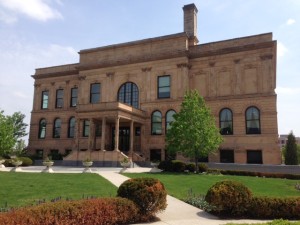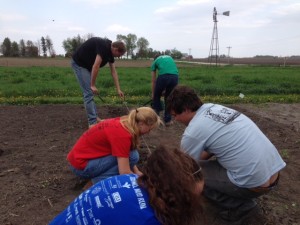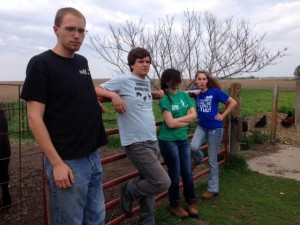Today was a rather easy going day in Iowa. It was also the first time it has been warm! Suns out, guns out, right? To summarize the day’s events, we began by learning about the Green Revolution and Norman Borlaug, the man responsible for the Green Revolution. We made the almost daily drive to Des Moines to the World Food Prize Hall of Laureates to learn about the World Food Prize–awarded to “outstanding individuals who have made vital contributions to improving the quality, quantity, or availability of food throughout the world”–and the life of Norman Borlaug. The overall tour was a little underwhelming in terms of information presented to us, especially because we were ushered out of the only room that had a good amount of information on global food issues and possible solutions. However, our disappointment was dashed when we visited the farm of the impossibly wonderful Dalona Fiscus. After showing us her cows and chickens, she permitted us to help her and her children plant this season’s flowers. Luckily, it was close to feeding time for the cows and egg collecting for the chickens. The latter involved reaching directly under the hen to get to her eggs. I feel like I violated her privacy, but what’s done is done. It was also incredibly warm under the chicken. If that’s what it takes to get warm, then I will gladly have a bunch of chickens lay on me in the winter (as long as the don’t poop, peck, or cluck).
Luckily, before the tour at the World Food Prize, we were briefed on the subject by reading Food Politics by Robert Paarlberg. It is a very good read so far, so I look forward to reading about the other material in the book. Essentially, the Green Revolution is the massive increase in food production per hectare in third world areas, especially in India, Southeast Asia, and Latin America. This came about because of new farming practices, including using fertilizer and irrigation, and varieties of corn, soy, wheat, and rice–otherwise known as the primary food sources in those regions–resistant to environmental and chemical factors. Norman Borlaug is involved because he was instrumental in developing and introducing these varieties to farmers in these nations. Consequently, this practice has grown into a complex market of massive biochemical companies that develop and sell pesticides and herbicides as well as GMOs that are resistant to such. Therefore, the environmentalists attack this approach for its environmental and social impacts, such as rising inequality, nutrient depletion in soil, and water contamination, among many other concerns. Overall, critics say the Green Revolution is unsustainable. If you don’t want to read the Paarlberg book, I believe this wikipedia article is also a good summary of the subject and its criticisms.
If I had to pick a side, I would say I am moderate but leaning on the sides of the environmentalists. I appreciate and support the mission of the World Food Prize and the Green Revolution in that they seek to eradicate world hunger by increasing the quantity, quality, and availability of food. However, the long term environmental and socioeconomic effects should always be considered. This more sustainable approach is known as “agroecology.” Unfortunately, most politics is driven by politicians and voters who want policies that bring quick, direct benefits but long-term costs. In this way, we do not see what the actual price of our actions are. Luckily, I believe that much of the public mood has shifted towards conservation, and many big agricultural plans typically involve an environmental checklist of sorts. The major ills of the Green Revolution attacked by environmentalists and conservations began in a time when we were ignorant of the effects, and we now know to anticipate these effects in the future. However, many parts of the world are stilly paying dearly for what happened in the 1970s and 80s, such as nations that hold areas of soil nutrient degradation, chemically polluted water, empowered and corrupt elites, and even worsened nutrition and health. Hopefully, a better dialogue between the advocates of both sides of the issue will create a happy medium of sustainable and healthy worldwide food production.




